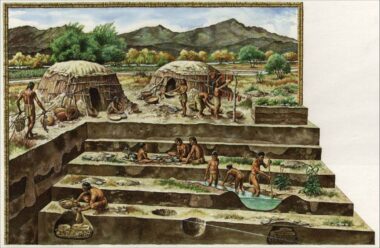Jonathan Mabry – “Irrigation, Social Changes, and Ecological Knowledge in Early Farming Societies in the Sonoran Desert”

Based on archaeological settlement patterns and cross-cultural comparisons, it may be inferred that the use of canals and irrigated field systems in the middle Santa Cruz Valley of southern Arizona by 1500 B.C. required cooperation among multiple families, and led to territoriality and tethered, recurrent sedentism within settlement districts bounded by each other. Cross-cultural comparisons also imply that this transition was associated with the development of the nuclear family household as the basic social and economic unit, concepts of private property ownership and inheritance, and continuity of household lineages. The roots of prehistoric villages in the Southwest can be seen in these new features of social organization.
Rather than interpreting early irrigation communities in this region as adaptations to environmental or population pressures, which appear to have been absent during the period of their formation, the alternative paradigm of “niche construction theory” from evolutionary biology may be a more appropriate explanatory framework. This theory recognizes a larger role for human agency, and interprets resource diversification and intensification in contexts of low population pressure and varying resource abundance as resulting from deliberate human efforts to manipulate the environment to enhance resource productivity and predictability. It also provides a model for how accretional irrigation systems were inherited and further developed by subsequent generations through niche-construction techniques and other traditional ecological knowledge that was culturally transmitted between generations.
 All Posts
All Posts